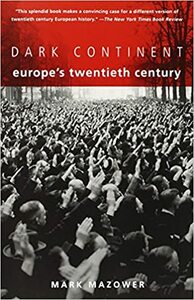Take a photo of a barcode or cover
probably the best skim of the political, economical and social history of 20th century europe
*
*
challenging
slow-paced
An important book for understanding European history, rather than the history of individual nation states. Mazower argues that the last century in Europe has been the story of conflicting ideologies—liberal democracies, Marxism-Leninism and Fascism. As such, it's a better explanation for the current state of affairs than the post-Arendt view of competing totalitarianisms. The question Mazower leaves us with is how will Europe develop from here, as the end of the Cold War and the new Europeanism are more the victory of capitalism than liberal democracy.
informative
reflective
medium-paced
A solid overview that actually manages to be a centre view. In the right-wing saturated popular history market this is refreshing. Comes close to Judt's Postwar, buy is less scathing of Marxism. It would be very interesting to see how the 1997 labour victory sense that permeates the last few chapters would look like in a 2015 new edition, after the wholesale turn of 'social democracy' to neoliberalism.
informative
slow-paced
informative
slow-paced
somehow both incredibly dense and completely scattered. mazower's argument, that the failures of economic liberalism and newly-fledged democracies in the interwar period were the direct cause of wwii and the rise of fascism is interesting but not fully explored. instead, mazower takes us through a meandering study of international relations and economic history of western europe. he relies extremely heavily on quotes, which are often unattributed, to make his points, with little analysis. the most problematic elements of his argument root from his avoidance of anything that conflicts or complicates his argument. there is very little mention of nationalist spain or fascist italy, and how the totalitarian paradigm was exhibited in both, or of how modernity and wwi played a role in inciting further conflict. instead the book is almost too focused on nazi germany and stalinist russia, to the detriment of further analysis once mazower reaches the postwar period. i would be interested in an edited, newer edition since this was from 1998. since mazower can't seem to decide whether the EU fits his unified theory of european communities or not, and hedges around any outright assertions, this book left me cold. it feels more like an outline of a good argument rather than a good argument itself.
highlights: mazower's clear strengths lie in analysis of balkan history and i was pleasantly surprised by the amount of attention given to the baltic states and southern europe compared to most other analyses of this period. i also liked the idea of three competing ideologies: democracy, fascism, and communism.
highlights: mazower's clear strengths lie in analysis of balkan history and i was pleasantly surprised by the amount of attention given to the baltic states and southern europe compared to most other analyses of this period. i also liked the idea of three competing ideologies: democracy, fascism, and communism.
challenging
informative
slow-paced




